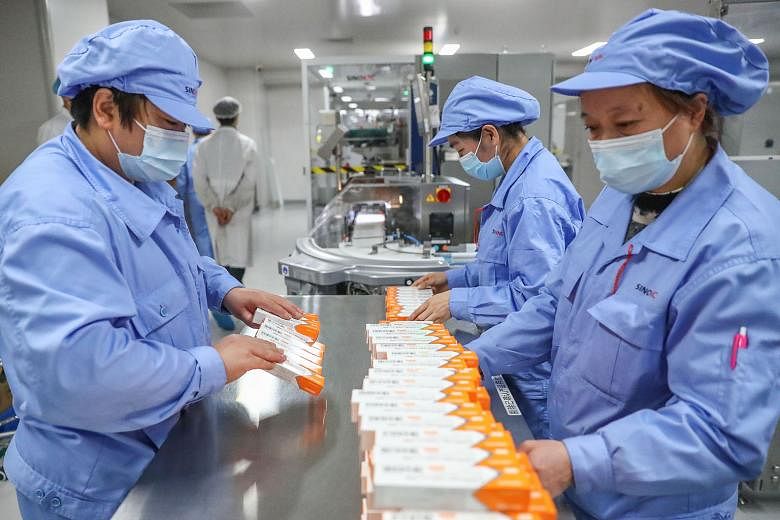BEIJING • China's Sinovac Biotech defended the efficacy of its Covid-19 shot, saying the vaccine being rolled out from Indonesia to Brazil despite inconsistent data is more effective if the two-dose regime is administered over a longer time frame.
Nearly 1,400 of the 13,000 people who took part in clinical trials of Sinovac's CoronaVac vaccine received their doses three weeks apart, while most of the volunteers in the Brazil-based trials got the second jab two weeks after the first.
The protection rate for the smaller group was nearly 20 percentage points higher than the 50.4 per cent rate observed in the majority, Sinovac said.
The comments come after CoronaVac delivered vastly different efficacy rates in four clinical trial sites.
Sinovac also reiterated that the participants in its Phase 3 trial in Brazil were medical workers who tended to Covid-19 patients, arguing that they faced higher exposure to the highly infectious pathogen.
"The vaccine's ability to protect medical workers in active outbreaks could significantly improve if they are administered between 21 or 28 days," it said.
Shots developed by Pfizer-BioNTech and Moderna generated much higher efficacy rates of more than 90 per cent in final-stage trials that included a more diverse range of people.
An experimental shot must be at least 50 per cent effective in preventing symptomatic Covid-19 to be approved for general use, a threshold held by the World Health Organisation and major drug regulators around the world.
The fresh details from Sinovac indicate that CoronaVac could be more than borderline effective in preventing the disease from taking hold in those who are inoculated, but also risk adding to the general confusion around the shot.
Trials in Indonesia and Turkey delivered efficacy rates ranging from 65 per cent to more than 90 per cent, but have been deemed largely inconclusive because of the small number of participants and fewer Covid-19 cases involved.
The rate for the smaller group in Brazil would put the vaccine on a par with results seen for the shot co-developed by AstraZeneca and the University of Oxford.
As vaccines are rolled out more broadly, greater attention is being paid to dose intervals and whether the time between shots plays a role in the immune response.
Dr Yang Xiaoming, chairman of the other Chinese Covid-19 vaccine front runner, China National Biotec Group, told Xinhua news agency last week that its shot - already approved in China for general use - could generate more lasting immunity and higher levels of antibodies if given three or four weeks apart, compared with just one or two weeks.
Despite the inconsistencies in its publicly announced efficacy rates, CoronaVac continues to be approved for use, with Brazil the latest to endorse its administration on an emergency basis.
Turkey authorised Sinovac's shot last Wednesday.
Chile, the Philippines, Thailand and Hong Kong also have deals or agreements to buy and distribute CoronaVac. Regulators in the Philippines and Hong Kong have asked for more complete data before receiving their shipments.
Meanwhile, Sinovac is submitting data for review in its home country, where the regulator endorsed CoronaVac for emergency use last July and is expected to rule soon on its viability for broader, general use.
BLOOMBERG

